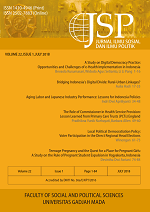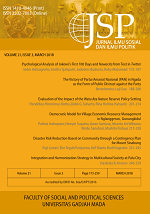Agriculture Liberalization and Marginalized Young Local People: Evidence from a Food Plantation in Lampung
Vanda Ningrum(1*)
(1) Research Center for Population, Indonesian Institute of Sciences
(*) Corresponding Author
Abstract
Since the 1980s, Indonesia has integrated its economy with global capitalism and has become liberal, particularly in the essential commodities, such as food, forestry, and mining. Moreover, this liberalization has created a diverse workforce and changed food production systems from family farming to corporate farming. Massive corporate farming raises a long debate, not only regarding the exclusion of small farmers but also regarding the changing social formations in the countryside that have led to a farmer regeneration crisis for young local people. Using social reproduction concepts, this study aims to analyze the rural social change including the impact for farmer families and access of local youth on job opportunity amid food corporate regime. The study is conducted in Terusan Nunyai sub-district of Central Lampung, which is identified as a high massive agriculture liberalization area in crops. The qualitative data is gathered from some literature reviews, direct observations, focus group discussion and in-depth interviews with some key informants. The research found that liberalization was followed by the land grabbing, and its food production systems have changed; they were previously based on household and tradition, but they switched into a corporate-based system (food estate). This corporate-based system employs many migrant workers, and after that, it changed the social class in the local community, between classes of employees and the local community classes as well. Limited capital and access of local people to get involved in the liberalization are considered to be the causes of marginalization of local people, including the young people's participation in the new social reproduction in the food regime.
Keywords
Full Text:
PDFReferences
Agriculture Cencus (Rep.). (2013). Indonesia: BPS-Statistic Indonesia.
Bernstein, H. (2015). Land grabbing, conflict and agrarian‐environmental transformations: Perspectives from East and Southeast Asia. Paper presented at An international academic conference in Chiang Mai University, Chiang Mai, Thailand.
Elmhirst, R. (2001). Resource struggles and the politic of place in North Lampung, Indonesia. Singapore Journal of Tropical Geography, 22(3). doi: 10.1111/1467-9493.00111
Carbone, A. & Subioli, G. (2008). Turnover in agriculture: The ageing dynamics and the EU support policies to young farmers. Paper presented at The Generational 109th EAAE Seminar, 20-21 November 2008 in Italy, Viterbo.
Hall, D. (2011). Land grabs, land control, and Southeast Asian crop booms. The Journal of Peasant Studies, 38(4), 837-857. doi: 10.1080/03066150.2011.607706
Harvey, D. (2005). A Brief History of Neoliberalism. Oxford: Oxford University Press.
Hasibuan, A. I. R. S. (2015). Kebijakan pangan pasca ratifikasi agreement on agriculture (AoA) - WTO post food policy ratification of the agreement on agriculture (AoA) - WTO. Jurnal Kajian Politik Dan Masalah Pembangunan, 11(01), 1633–1644.
Indonesian Statistics (2013). Kabupaten Lampung Tengah dalam angka. Jakarta: Badan Pusat Statistik.
Kingston, J. B. (1987). The manipulation of tradition in Java's shadow: Transmigration, decentralization and the Ethical Policy in colonial Lampung. (PhD Thesis, Columbia University, 1987). New York: Columbia University.
Koning, J. (1997) Generation of change: A Javanese Village in the 1990s. (PhD Thesis, University of Amsterdam, 1997). Netherland: University of Amsterdam.
Leavy, J., & Smith, S. (2010). Future farmers: Youth aspirations, expectations and life Choices (Rep.).
Lloyd, C. (2005). Growing up Global: The changing transitions to adulthood in developing countries, The National Academies Press, Washington, DC.
Marx, K. (1867). Capital: A critique of political economy (Vol 1: The Process of Capitalist Production). S. Moore & E. Aveling, Trans.). Chicago: Charles H. Kerr and Co.
McMichael, P. (2013). Historicizing Food Sovereignty: a Food Regime Perspective. Food Sovereignty: A Critical Dialogue. Paper presented at International Conference Yale University, September 14-15, 2013 in Netherlands.
McMichael, P. (2014). A comment on Henry Bernstein’s way with peasants, and food sovereignty. The Journal of Peasant Studies, 42(1), 193–204. doi: 10.1080/03066150.2014.936853
Minza, W. M. (2014). Growing up and being young in an indonesian provincial town (Rep.)
Musjtari, D. N. (2014). Dampak Liberalisasi Perdagangan dalam WTO Agreement terhadap Ketahanan Pangan Indonesia. Kanun Jurnal Ilmu Hukum, 63, 221–246.
Naafs, S. & Ben, W. (2012). Generasi Antara: Refleksi tentang Studi Pemuda Indonesia. Jurnal Studi Pemuda, 1(2), 89-106.
Ningrum, V., Athor, S. W., Aji, G. B., Dewi,H., Amorisa, W., & Joko, S. (2016).Rural youth aspiration in agriculture,support or threaten food security?. In 3rd Asia Future Conference, Evironment & Coexistence, September 29- October 3 2016. Japan: Kitakyushu.
Roberts, K. (2009). Youth in transition: Eastern Europe and the West. Basingstoke: PalgraveMacmillan.
Safitri, M. (2010). Man Land and Forest in Lampung. Retrieved from https://openaccess.leidenuniv.nl/bitstream/handle/1887/16242/06.pdf?sequence=12
Ploeg, J. D. (2008). The new peasantries, struggles for autonomy and sustainability in an era of empire and globalization. London: Earthscan. doi: 10.1007/s13398-014-0173-7.2
Wells, K. (2009). Childhood in a Global Perspective. Cambridge: Polity Press.
White, B. & Margiyati. (2016). Teenage Experiences of School, Work, and Life in a Javanese Village. In K. Robinson (Ed.), Youth Identities and Social Transformations in Modern Indonesia (pp. 50–68). London: Koninklijke Brill.
White, B. (2015). Meneliti Masalah Petani dan Pangan Pada Tingkat Lokal. Pengantar Studi Kemandirian Pangan Akatiga. Jurnal Analisis Sosial, 19(1), 1-10.
Yamashita, K. (2008). The Perilous Decline of Japanese Agriculture. Retrieved December, 2014, from http://www.tokyofoundation.org/en/articles/2008/the-perilous-decline-of-japanese-agriculture-1
Article Metrics
Refbacks
- There are currently no refbacks.
Copyright (c) 2019 Jurnal Ilmu Sosial dan Ilmu Politik

This work is licensed under a Creative Commons Attribution-NonCommercial-NoDerivatives 4.0 International License.






















